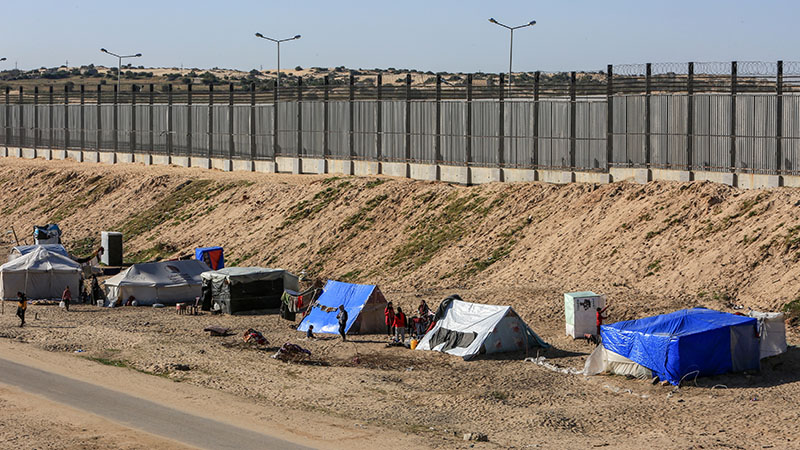


The conflict between Israel and Hamas in Gaza has entered its eighth month, presenting bleak options for both sides [f9fe5c1b]. One proposed option is a full-scale military occupation by Israel, but historical precedents caution against this approach [f9fe5c1b]. Another proposal involves a lighter occupation, with Israel maintaining security control while delegating civilian administration to local Palestinians unaffiliated with Hamas or the Palestinian Authority [f9fe5c1b]. A grand bargain supported by the United States seeks a broader resolution to the Israeli-Palestinian conflict, but it demands substantial concessions from all parties involved [f9fe5c1b].
Hamas has proposed a ceasefire that includes the release of hostages in exchange for Palestinian prisoners, Israeli withdrawal, and a ceasefire [f9fe5c1b]. While this proposal may be more palatable to some Israelis, it carries the risk of leaving Hamas in control and potentially stronger in the long term [f9fe5c1b]. Each scenario carries significant risks and trade-offs, highlighting the need for a creative and sustainable solution to avoid severe humanitarian and political repercussions [f9fe5c1b].
Egypt's strategy to contain the conflict in Gaza and prevent it from spilling over into Sinai is facing limitations [1e1209c2]. The peace agreement with Israel has been a strategic choice for Egypt for 40 years, but managing the status quo in Gaza has allowed Egypt to focus on the threat of jihadist forces in Sinai [1e1209c2]. Egypt has tolerated Israeli actions that could trigger negative responses, but the reddest line for Cairo would be an Israeli attempt to push Palestinians into Sinai [1e1209c2]. Egypt has very little diplomatic leverage and is pursuing a containment strategy to balance its multiple interests in the region [1e1209c2].
Egypt's peace treaty with Israel transformed its domestic politics and allowed the military to become a major player in the national economy [1e1209c2]. However, the rise of Hamas in Gaza complicated Cairo's calculations [1e1209c2]. Egypt and Israel have different visions for Gaza's political future, with Egypt backing the Biden administration's proposal for a three-stage ceasefire and a reformed Palestinian Authority to assert leadership in Gaza [1e1209c2]. Israel has rejected this approach [1e1209c2]. Egypt's efforts to balance peace with Israel and rekindle a diplomatic process on the Palestinian issue have been complicated by the tunnel issue [1e1209c2]. Egypt has avoided a full-on assault on Hamas's tunnels due to their role in supporting Gaza's economy and as a source of income for many Gazans [1e1209c2]. Egypt has faced conflicting pressures and has little power over the key protagonists in the Gaza war [1e1209c2]. The war has sparked protests in Egypt, but the regime's stability depends on preventing economic troubles [1e1209c2]. The war has also affected Egypt's economy, with a drop in Suez Canal revenues and increased aid from European countries and multilateral organizations [1e1209c2].
Egypt's containment strategy depends on the Biden administration securing a ceasefire and a wider political solution to the Palestinian-Israeli conflict [1e1209c2]. However, as long as Netanyahu remains in office and is dependent on his ultra-nationalist allies, there is little hope for a wider political vision [1e1209c2]. The authors propose a plan for Gaza to be demilitarized using a foreign force, but this would require cooperation from Egypt [1e1209c2]. The authors also suggest that the Biden administration could provide financial incentives to Egypt to stop smuggling by allowing Egyptian contractors to lead the reconstruction of Gaza [1e1209c2]. However, these proposals seem disconnected from the realities and forces that have led to the present situation [1e1209c2]. Egypt's capacity to move beyond its containment policy depends on the Biden administration's ability to secure a ceasefire and a wider political solution [1e1209c2].
The complexities of the Israeli-Palestinian conflict and the ongoing calls for a ceasefire highlight the challenges and differing perspectives surrounding the path towards a resolution [f9fe5c1b]. The situation in Gaza remains dire, with Palestinians being forced to negotiate with Israel due to Hamas's actions [f9fe5c1b]. It is crucial to consider the inter-party disputes within the Palestinian leadership and the role of external actors in perpetuating divisions [aa9fb721]. Sustained efforts to reject forced displacement and hold Israel accountable are necessary, but caution must be exercised to avoid potential harm to the Palestinian international position [aa9fb721]. The evolving viewpoints and opinions shed light on the complexities of the conflict and the ongoing search for peace [aa9fb721].